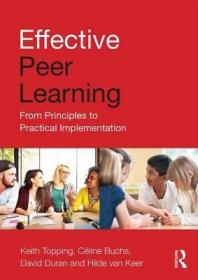
现货Effective Peer Learning: From Principles to Practical Implementation[9781138906495]
¥ 369 九五品
仅1件
上海宝山
认证卖家担保交易快速发货售后保障
作者Topping, Keith ; Buchs, Céline ; Duran, David ; Van Keer, Hilde
出版社Routledge
ISBN9781138906495
出版时间2017-03
装帧平装
纸张其他
页数192页
正文语种英语
上书时间2023-06-07
- 最新上架
商品详情
- 品相描述:九五品
- 商品描述
- Peer learning allows a positive use of differences between pupils, turning them into learning opportunities. Yet education professionals often remain unfamiliar with the principles necessary to guarantee its effectiveness. The aim of this book is to help practitioners establish well-structured and effective peer learning projects using a variety of methods. It introduces and defines cooperative learning (mutual peer interaction) and peer tutoring (directional peer interaction) - outlining general organisational principles that will help practitioners implement peer learning in either of these forms. The authors consider how to prepare and train learners to undertake their roles effectively, and how to organise and monitor the process of interaction as it is happening. They then look at how these systems actually operate in the classroom, exploring how the organisational principles work in practice and giving many practical examples. Subsequently three successive chapters co
— 没有更多了 —
![现货Effective Peer Learning: From Principles to Practical Implementation[9781138906495]](https://www0.kfzimg.com/sw/kfz-cos/kfzimg/17733071/92bf74f796d0a7f1_b.jpg)

![现货Materials and Technologies of Modern Production[9783036401683]](https://www0.kfzimg.com/sw/kfz-cos/kfzimg/17733071/5fd2824531e165d7_s.jpg)
![现货Introduction to Container Ship Operations and Onboard Safety[9781032155425]](https://www0.kfzimg.com/sw/kfz-cos/kfzimg/17733071/58b7ff43ef7909ee_s.jpg)
![现货Electrophosphorescent Materials and Devices[9789814877343]](https://www0.kfzimg.com/sw/kfz-cos/kfzimg/17733071/18cc1d77bcb7b488_s.jpg)
![现货Organic Semiconductors for Optoelectronics[9781119146100]](https://www0.kfzimg.com/sw/kfz-cos/kfzimg/17733071/24c85a750c708964_s.jpg)
![现货Advances in Food Rheology and Its Applications[9780081004319]](https://www0.kfzimg.com/sw/kfz-cos/kfzimg/17733071/e0c11603c9119d4d_s.jpg)
![现货Advanced Materials and Sustainable Technologies[9783035727562]](https://www0.kfzimg.com/sw/kfz-cos/kfzimg/17733071/dced675333874c48_s.jpg)
![现货Advanced Materials and Manufacturing Engineering II[9783035712681]](https://www0.kfzimg.com/sw/kfz-cos/kfzimg/17733071/660ccfae75fa8d3e_s.jpg)
![现货Materials in Machinery and Construction[9783035718119]](https://www0.kfzimg.com/sw/kfz-cos/kfzimg/17733071/6f402060775e9daa_s.jpg)
![现货Cereal Grain Quality (Softcover Reprint of the Original 1st 1996)[9789401071772]](https://www0.kfzimg.com/sw/kfz-cos/kfzimg/17733071/f93ca1c96a97403a_s.jpg)
![现货Effective Peer Learning: From Principles to Practical Implementation[9781138906495]](/dist/img/error.jpg)
以下为对购买帮助不大的评价